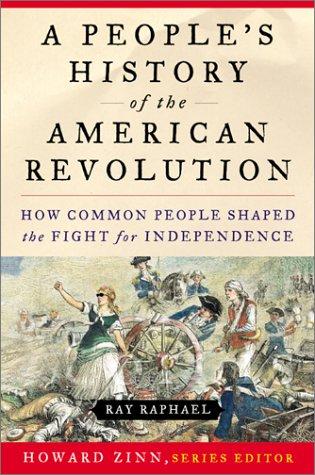506 pages
English language
Published Nov. 3, 2002 by Perennial.
how common people shaped the fight for independence

506 pages
English language
Published Nov. 3, 2002 by Perennial.
Raphael explains the central purpose of his "people's history" thusly: "By uncovering the stories of farmers, artisans, and laborers, we discern how plain folk helped create a revolution strong enough to evict the British Empire from the thirteen colonies. And by digging deeper still, we learn how people with no political standing -- women, Native Americans, African Americans -- altered the shape of a war conceived by others." After carefully reconstructing the histories of all these groups, he concludes: "The story of our nation's founding, told so often from the perspective of the 'founding fathers,' will never ring true unless it can take some account of the Massachusetts farmers who closed the courts, the poor men and boys who fought the battles, the women who followed the troops, the loyalists who viewed themselves as rebels, the pacifists who refused to sign oaths of allegiance, the Native Americans who struggled for …
Raphael explains the central purpose of his "people's history" thusly: "By uncovering the stories of farmers, artisans, and laborers, we discern how plain folk helped create a revolution strong enough to evict the British Empire from the thirteen colonies. And by digging deeper still, we learn how people with no political standing -- women, Native Americans, African Americans -- altered the shape of a war conceived by others." After carefully reconstructing the histories of all these groups, he concludes: "The story of our nation's founding, told so often from the perspective of the 'founding fathers,' will never ring true unless it can take some account of the Massachusetts farmers who closed the courts, the poor men and boys who fought the battles, the women who followed the troops, the loyalists who viewed themselves as rebels, the pacifists who refused to sign oaths of allegiance, the Native Americans who struggled for their own independence, the southern slaves who fled to the British, the northern slaves who negotiated their freedom by joining the Continental Army". Raphael's account rings true: these people made the American Revolution. - Marcus Rediker, University of Pittsburgh.